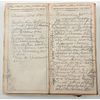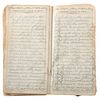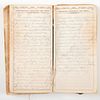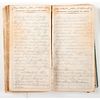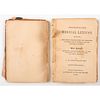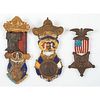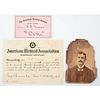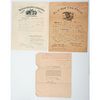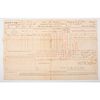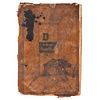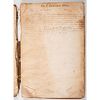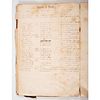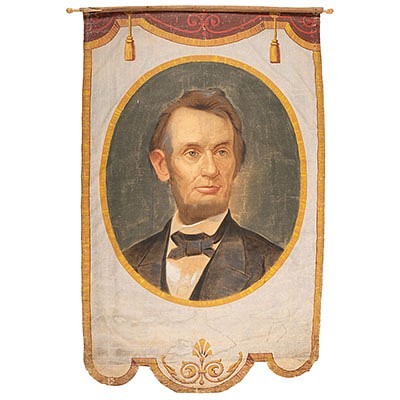[CIVIL WAR]. MUNGER, George D. (1841-1909). An archive of ephemera related to Capt. George D. Munger, Co. D, 7th Michigan Infantry and POW Libby Priso
About Seller
6270 Este Ave.
Cincinnati , OH 45232
United States
With offices in Cincinnati, Cleveland and Denver, Cowan’s holds over 40 auctions each year, with annual sales exceeding $16M. We reach buyers around the globe, and take pride in our reputation for integrity, customer service and great results. A full-service house, Cowan’s Auctions specializes in Am...Read more
Two ways to bid:
- Leave a max absentee bid and the platform will bid on your behalf up to your maximum bid during the live auction.
- Bid live during the auction and your bids will be submitted real-time to the auctioneer.
Bid Increments
| Price | Bid Increment |
|---|---|
| $0 | $25 |
| $500 | $50 |
| $1,000 | $100 |
| $2,000 | $250 |
| $5,000 | $500 |
| $10,000 | $1,000 |
| $20,000 | $2,500 |
| $50,000 | $5,000 |
| $100,000 | $10,000 |
About Auction
Jun 25, 2021
The June 25 American Historical Ephemera and Photography Auction features an exciting assemblage of 18th-early 20th century material, including Civil War archives, Early Photography, Western Americana, Autographs and Manuscripts, and more. Cowan's Auctions dawnie@cowans.com
- Lot Description
3 x 6 in. pocket diary for the year 1864 with page-per-day format (completely separated at spine, missing back cover). Pencil entries, 300+ pp, identified on interior to "George D. Munger" of "Dundee / Monroe Co. / Michigan." Diary spans 1 January 1864 through 22 February 1865. Daily entries describe Munger's service including participation in critical Overland Campaign battles at North Anna, Totopotomoy, Cold Harbor, and then on to Petersburg, as well as his capture and confinement while a Confederate POW at Libby Prison. Transcript included with diary.
[With:] Michigan 7th Veteran Volunteer Infantry, Co. D, Descriptive Book, ca 1864-1865, containing the official roll of commissioned officers and enlisted men in the company (heavily worn, nearly completely separated at spine). Leather bound, approx. 10.25 x 15.5 in., 60 pp. utilized. Containing lists of commissioned officers and non-commissioned officers, discharges, transfers, deserters, and descriptive roll for each soldier. -- Muster-In Roll of Capt. George D. Munger, 7 MI Veteran Volunteers, 10/5/1864, near Petersburg, VA. -- Discharge of Capt. George D. Munger, 7/5/1865, at Jeffersonville, IN. -- Special Orders #126 amending Munger's dates of muster and pay, 3 June 1885. -- Three pension documents granting Eunice M. Munger a widow's pension following the death of her husband. -- Group of 3 GAR medals, 1899 Philadelphia encampment, 1904 Boston encampment, and GAR membership badge.
[Also with:] An undated post-war photograph of George D. Munger (tears, significant losses around borders). -- Pronouncing Medical Lexicon, Containing the Correct Pronunciation and Definition of Terms Used in Medicine and the Collateral Sciences. Philadelphia: Lindsay & Blakiston, 1880. Approx. 3.25 x 4.75 in. 302pp. -- Two miscellaneous documents related to Munger's medical career. - US Navy shoulder boards indicating rank of Lieutenant, JG, ca WWI, connection to archive unknown.
HDS indicates that George D. Munger enlisted at Monroe, MI, on August 12, 1861, as a private. He mustered into Co. D, Michigan 7th Infantry and later re-enlisted on 12/18/1863, shortly before he commenced utilizing the diary offered here. He was listed POW, 8/25/1864 at Ream's Station, and after almost six months in captivity was paroled. Having attained the rank of captain, Munger mustered out 7/5/1865. He was a member of GAR Post #17 (Oklahoma City, OK), and at one time served as the Department Commander. In 1884, Munger received his medical degree from the College of Physicians and Surgeons in St. Louis. He is believed to be the first physician to establish a practice in Oklahoma City.
By the time George D. Munger wrote his first entry for the year 1864, he was already a seasoned soldier. During his first enlistment, Munger and his fellow soldiers of the MI 7th had seen extensive combat, participating in the Battles of Antietam and Gettysburg, and bolstering the regiment's reputation for bravery by volunteering at Fredericksburg to cross the Rappahannock in pontoon boats while under fire from Confederate sharpshooters. As January 1864 dawned, Munger was home in Monroe, MI, on a hard-earned 30-day furlough. Entries for this period of the diary span only Jan. 1-4, with daily entries resuming Feb. 10, 1864, through Feb. 22, 1865. Early months of 1864 see Munger detailed to recruiting service in Michigan until he is ordered to report to the field on April 27, 1864.
As Munger joins his regiment on May 19, 1864, Grant's Wilderness Campaign is fully underway and the MI 7th is fiercely engaged in it. Over the course of the next months, Munger would document his regiment's activity as it battled its way from Spotsylvania Court House, to North Anna, to Totopotomoy, Cold Harbor, to the First Assault on Petersburg, to Jerusalem Plank Road and Weldon Railroad, to Strawberry Plains, and finally to Ream's Station, where Munger would be taken captive on August 25, 1864. Each step of the campaign, Munger provides vivid details of his activities, as in this entry from June 3, 1864, describing the disastrous fighting at the Battle of Cold Harbor: "At 3AM the men were all ordered up and to be ready at 4AM to move. 4 found us in line ready to meet any call. The signal for the charge was given and off we started (many never to return) for the enemies works advanced to them but could not curry them. The troops then laid down for 15 long hours exposed to the scorching sun to await the approach of darkness. At night we threw up entrenchments and relieved ourselves in a great [?] this has been a terrible day our loss was heavy...."
Following his participation in the battles at Jerusalem Plan Road and Weldon Railroad as documented in his diary on June 22-23, Munger is taken with fever and removed from the battlefield. He will not return to his regiment until August 18, at which point he finds them "on the front line of battle and exposed to a heavy fire from the enemy." Just days later on August 25, 1864, Munger would again find himself heavily engaged at the Battle of Ream's Station, and unable to escape from the enemy: "...the Rebs came down upon us from the front and rear we had no chance to escape and the result was that we are captured. My capturer was the 12th SC Infty. Marched 3 miles to the rear and have settled for the night." Two days later Munger writes, "...took the cars for Richmond and arrived thare [sic] at 6PM marched down Main Street to Libby Prison. Our quarters are on the 3d floor...."
Munger continues to document his captivity in daily entries first from Libby Prison, then from Salisbury Prison (NC), and finally from "an old tobacco factory" in Danville (VA). He describes forced marches, escape attempts, horrific cold and hunger, and inhumanity, as in this instance of Sunday, Oct. 16, 1864: "Lieut. John Davis of 155 NY Infty. was shot dead this morning while standing talking with me by one of the guards without any provocation whatever. It was a fiendish act one that is often perpetrated on defenseless Union prisoners of war." On November 8, 1864, he describes how "we the officers of this military prison held an election for President and Vice President of the United States...."
Returning to the page for Jan. 1, 1864, Munger begins his entries for 1865. January 1865 begins with news of a prisoner exchange, and indeed on February 16, 1865, "...this evening we received orders to be ready to move to Richmond on Friday for exchange. This was welcomed news to us." On Wednesday, February 22, 1865, Munger wrote his final diary entry, which reads in part: "We left Libby at the appointed hour...we left the Rebel boat at Coxes Landing and marched across the country 3 miles to Varena thare [sic] we beheld the Stars and Stripes once more...."
An exceptional diary and record of the MI 7th Infantry.
RARE. OCLC LOCATES NO OTHER CIVIL WAR MANUSCRIPTS BY THIS SOLDIER WHO SERVED NEARLY THE ENTIRETY OF THE WAR. - Shipping Info
-
SHIPPING & PICKUPS Cowan’s Cincinnati Office offers an in-house, full-service shipping department which is unparalleled in the auction industry. Shipping costs are provided with your finalized invoice 24-48 hours after auction. For furniture and oversized items, we recommend using third-party services. For more information, contact cowansshipping@hindmanauctions.com. NOTE: All pickups and preview are by appointment only. To make an appointment, please call 513-871-1670 or email cincinnati@hindmanauctions.com Buyers are required to pay for all packing, shipping and insurance charges. Overseas duty charges are the responsibility of the successful Bidder. Be aware that for larger and/or valuable items, shipping charges can be substantial. - Shipping charges include insurance for your order while in transit. If you have private insurance we will adjust your charge to include only packing and shipping. - Please allow 14 – 21 days after payment to package and ship your purchase as carefully as possible.
-
- Buyer's Premium



 EUR
EUR CAD
CAD AUD
AUD GBP
GBP MXN
MXN HKD
HKD CNY
CNY MYR
MYR SEK
SEK SGD
SGD CHF
CHF THB
THB![[CIVIL WAR]. MUNGER, George D. (1841-1909). An archive of ephemera related to Capt. George D. Munger, Co. D, 7th Michigan Infantry and POW Libby Priso](https://s1.img.bidsquare.com/item/l/8589/8589765.jpeg?t=1LMY9Q)
![[CIVIL WAR]. MUNGER, George D. (1841-1909). An archive of ephemera related to Capt. George D. Munger, Co. D, 7th Michigan Infantry and POW Libby Priso](https://s1.img.bidsquare.com/item/s/8589/8589765.jpeg?t=1LMY9Q)
